- Home
- Richard Lee Byers
Unclean: The Haunted Lands Page 14
Unclean: The Haunted Lands Read online
Page 14
“What do you think there is to learn?”
“We’ll know when we find it.” Aoth remembered his resolve to lead by consensus, or at least to give the appearance, and looked around at the other officers in the circle. “What do the rest of you think?”
As expected, the other necromancers sided with Urhur, but rather to Aoth’s relief, the Burning Braziers stood with him, perhaps because Urhur so plainly considered himself their superior as well. It gave the griffon rider the leeway to choose as he wanted to choose without unduly provoking the Red Wizards, or at least he hoped it did.
“Much as I respect your opinions,” he said to Urhur, “I think that this time we need to do it the hard way. We’ll divide the company into squads who will search house to house. We need at least one necromancer or priest in every group, and we want the monks and Black Flame Zealots sticking close to the Burning Braziers in case a quell or something similar appears. Clear?”
Apparently it was. Though after he turned away, he heard Urhur murmur to one of his fellows that it was a crime that a jumped-up little toad of a Rashemi should be permitted to risk Mulan lives merely to pursue a forlorn hope of rescuing others of his kind.
The nature of the battle to come required fighting on the ground, and as the company advanced, Aoth and Brightwing strode side by side.
“You should have punished Urhur Hahpet for his disrespect,” the griffon said.
“And wound up chained in a dungeon for my temerity,” Aoth replied, “if not now, then when the campaign is over.”
“Not if you frightened him properly.”
“His specialty is manipulating the forces of undeath. How easily do you think he scares?”
Still, maybe Brightwing was right. The Firelord knew, Aoth had never aspired to be a leader of men—he only needed good food, strong drink, women, magic, and flying to make him happy—and he still found it ironic that he’d ascended to a position of authority essentially by surviving a pair of military disasters. Contributing to a victory or two struck him as a far more legitimate qualification.
Which was to say, he was certain of his competence as a griffon rider and battle mage but less so of his ability as a captain. Still, here he was, with no option but to try his best.
“Maybe Urhur won’t survive the battle,” Brightwing said. “Maybe that would be better all around.” It was one of those moments when the griffon revealed that, for all her augmented intelligence and immersion in the human world, she remained a beast of prey at heart.
“No,” Aoth said. “It would be too risky, and wasteful besides, to murder one of our most valuable allies when we still have a war to fight. Anyway, it wouldn’t sit right with me.”
The griffon gave her wings a shake, a gesture denoting impatience. Her plumage rattled. “This squeamishness is why they never gave you a red robe.”
“And here I thought I was just too short.”
As the company neared the village, Aoth heard the flies buzzing over the carcasses in the corral, and the stink of spilled gore and decay grew thicker and fouler. The sound and smell clashed with the warmth and clear blue sky of a fine late-spring day, a day when lurking undead constituted a preposterous incongruity.
It occurred to him that if he could only expose them to the light of the sun shining brightly overhead, they might not lurk for long. He pointed his spear at the barn he and his squad were approaching, a structure sufficiently large that it seemed likely two or more families had owned it in common.
“Can you tear holes in the roof?”
Brightwing didn’t ask why. She was intelligent enough to comprehend and might well have discerned the reason through their psychic link even if she weren’t. “Yes.” She unfurled her wings.
He stepped away to give her room to flap them. “Just be careful.”
She screeched—derisively, he thought—and leaped into the air.
Aoth led his remaining companions to the door. He started through then hesitated. Should a captain take the lead going into danger or send common and presumably more expendable warriors in ahead? After a moment’s hesitation, he proceeded. He’d rather be thought reckless than timid.
Inside, the mangled bodies of plow horses and goats lay where they’d dropped. The buzzing of the flies seemed louder and the stench more nauseating, as if the stale, hot, trapped air amplified them. Overhead, the roof cracked and crunched, and a first sunbeam stabbed down into the shadowy interior. Particles of dust floated in the light.
For a moment, nothing stirred except the swarming flies and the drifting motes. Then a thing that had once been a man floundered up from underneath a pile of hay. Clutching a saw as if it hoped to use the tool as a makeshift sword, it shuffled forward.
The zombie wore homespun peasant garb and showed little sign of decay, but no one who observed the glassy eyes and slack features could have mistaken it for a living thing. It made a wordless croaking sound, and its fellows reared up from their places of concealment.
Aoth leveled his spear to thrust at any foe that came within reach and considered the spells he carried ready for the casting. Before he could select one, however, Chathi stepped to the front line. Not bothering with her torch, she simply glared at the zombies and rattled off an invocation to her god. Blue and yellow fire danced on her upper body, and Aoth stepped back from the sudden heat. All but one of the zombies burst into flame and burned to ash in an instant. His face contorted with rage and loathing, a soldier armed with a battle-axe confronted the one remaining, first sidestepping the clumsy stroke of a cudgel and lopping off the gray hand that gripped it then smashing the undead creature’s skull.
Was that it? Aoth wondered. Had they cleared the barn? Then Brightwing screeched, “Watch out! Above you!”
A hayloft hung over the earthen, straw-strewn floor, and now darkness poured over the edge of it like a waterfall. In that first instant, it looked like a single undifferentiated torrent of shadow. It was only when it splashed down and the entities comprising it sprang apart, launching themselves at one foe or another, that Aoth could make out the vague, inconstant semblances of men and hounds. Even then, the phantoms were difficult to see.
Brightwing’s cry had no doubt served as a warning of sorts even to those who couldn’t understand her voice. Still, the dark things were fast, and some of Aoth’s men failed to orient on them quickly enough. The shadows snatched and bit, and though their touch shed no blood and left no visible marks, warriors gasped and staggered or collapsed entirely. The soldier who’d destroyed the zombie bellowed and swept his axe through the spindly waist of the creature facing him. By rights, the stroke should have cut the spirit entirely in two, but manifestly unharmed, the phantom drove its insubstantial fingers into its opponent’s face. He fell backward with the undead entity clinging like a leech on top of him.
“You need some form of magic to hurt them!” Aoth shouted. “If you don’t have it, stay behind those who do!” He pivoted to tell Chathi to use her torch.
Unfortunately, she’d dropped it, probably when one of the ghostly hounds charged in and bit her. The same murky shape was lunging and snapping at her now. She might have destroyed or repelled it with a spell or by the simple exertion of faith that had annihilated the zombies, but perhaps the debilitating effect of her invisible wound or simple agitation was hampering her concentration. Meanwhile, the monk assigned as her bodyguard was busy with two shadows, one man-shaped and one canine, of his own.
Aoth charged the point of his lance with additional power and drove it down at the shadow-beast assailing Chathi. The thrust drove into the center of the phantom’s back and on through into the floor. The spirit withered away to nothing.
“Thank you,” the priestess stammered, teeth chattering as if she’d taken a chill.
“Pick up the torch and use it,” Aoth snapped then glimpsed motion from the corner of his eye. He pivoted toward it.
The shadow gripped the semblance of a battle-axe in its fists, and despite its vagueness, Aoth could m
ake out hints of a legionnaire’s trappings in its silhouetted form. The warrior who’d slain the zombie had risen as a shadow to menace his former comrades, and the transformation had occurred mere moments after his own demise.
Aoth tried to swing his spear into position to pierce his foe, but he’d driven it too deep into the earth. It took an instant too long to jerk it free, and the phantom warrior rushed into the distance and swung its axe.
Had the axe been a weapon of steel and wood and not, in effect, simply the ghost of one, the blow would have sheared off his right arm at the shoulder. As it was, the limb went numb. Cold and weakness stabbed through his entire body, and his knees buckled. He stumbled, and the shade lifted the axe for another blow.
Before it could strike, a flare of flame engulfed it, and it burned away to nothing. As close as they’d been, the blast could easily have burned Aoth as well, but he wasn’t inclined to complain.
“Thanks,” he gasped to Chathi.
“Now we’re even,” she replied, grinning. Torch extended, she turned to seek another target.
Striving to control his breathing, Aoth invoked the magic bound in his tattoos to alleviate his weakness and the chill still searing his insides. He then rattled off a spell. Darts of blue light hurtled from his fingertips, diverging to streak at shadows at various points around the barn. Some saw the attack coming and sought to dodge, but the missiles veered to compensate. It was one of the virtues of this particular spell that in most situations it simply couldn’t miss.
Next he conjured a crackling, forking flare of lightning. Like his previous effort and Chathi’s attacks, it blasted more shades out of existence, but plenty remained, or so it seemed to him, reinforced by the tainted essences of those they’d already managed to slay, and he wondered if he and the Burning Brazier could eradicate them in time to keep them from annihilating the squad.
Then a crash sounded overhead. Scraps of wood and shingle showered down, and Brightwing plunged after them through the breach she’d created into the midst of several shadows. Her talons and snapping beak flashed right and left.
Her entry into the battle helped considerably. It only took a few more breaths to clear the remaining shades away.
The griffon tossed her head. “Stick me on the roof to punch holes. What a clever idea.”
“It would have been useful,” said Aoth, “if it had been a different sort of undead, vampires maybe, or certain types of wraith, hiding inside here.” Something about his own words nagged at him, but he wasn’t sure what and didn’t have time to puzzle it out. He turned to Chathi. “Can you tend to those who are hurt?”
“You’re first,” she said.
She murmured a prayer, and a corona of blue flame rippled across her hand. She lifted her fingers to his face, and this time he, who’d experienced the healing touch of a cleric of the Firelord on previous occasions, had little difficulty resisting the natural urge to flinch away.
As he’d anticipated, the heat of the flames was mild enough to be pleasant as it flowed through him to melt chill and debility away. Her caress was pleasurable in a different way. Her fingers were hard with callus like his own, the digits of a woman who’d trained to fight the enemies of her faith with mundane weapons as well as magic, but there was softness in the way they stroked his cheek, and they lingered for a moment after the healing was done.
It gave him something else to think about, but not now, not when he didn’t know what else was lying in wait in the hamlet or how the other squads were faring. He waited for her to minister to anyone else who’d suffered but survived the shadows’ touch, then formed up his troops and moved on.
As it turned out, the undead had congregated in four sites altogether, whether for mutual defense or simply out of some instinct to flock, Aoth wasn’t knowledgeable enough to guess. It wasn’t easy to clean out any of the three remaining locations, but none proved as difficult as the barn. The Thayans purged the village with acceptable losses on their own side, or so Nymia Focar would certainly have said.
As he glumly surveyed the several dead men laid out on the ground, Aoth found he had difficulty achieving a similar perspective. Over the years, he’d grown accustomed to watching fellow legionnaires die, but never before had it been because he himself had ordered them into peril.
Necklace rattling, bony staff sweating a greenish film, perhaps the residual effect of some spell he’d cast with it in the heat of battle, Urhur Hahpet sauntered up to view the corpses. “Well,” he said, “it appears there were no survivors for you to rescue.”
“No,” Aoth said.
“I assume, then, that you gleaned some critical piece of information to justify our casualties.”
Aoth hesitated, fishing inside himself for the insight that had nearly come to him after Chathi burned the zombies. It continued to elude him. “I don’t know. Probably not.”
Urhur sneered. “By the Dark Sun! If you claim to be a wizard, act like it. Stop moping. You blundered, but you’re lucky. You have necromancers to shield you from the consequences of your poor judgment. Just stand back and let me work.”
Aoth did as the Red Wizard wished. Urhur cast handfuls of black powder over the bodies then whirled his staff through complex figures. He chanted in a grating language that even his fellow mage couldn’t comprehend, though the mere sound of it made his stomach queasy. The ground rumbled.
Aoth felt a sudden urge to stop the ritual, but of course he didn’t act on it. Szass Tam himself had decreed that his minions were to exploit the fallen in this manner. Besides, Aoth had served with zombies and such since his stint in the legions began. Indeed, thanks to the Red Wizards who’d brought them along, he already included a fair number in the company he currently commanded, so above and beyond any normal person’s instinctive distaste for necromancy and its products, he didn’t understand his own reaction.
The dead rose, not with the lethargic awkwardness of common zombies, but with the same agility they’d exhibited in life. The amber eyes of dread warriors gleaming from their sockets, they came to attention and saluted Urhur.
“You see?” the Red Wizard asked. “Here they stand to serve once more, only now stronger, more difficult to destroy, and incapable of cowardice or disobedience. Improved in every way.”
Responsive to Xingax’s will, the hill-giant zombie fumbled with the array of lenses on their swiveling steel arms. The hulking creature was trying to give its shortsighted master with his mismatched eyes a clear, close view of the work in progress on the floor below the balcony, but it couldn’t align the glasses properly no matter how it tried. Finally Xingax waved it back, shifted forward on his seat, and pulled at the rods with the small, rotting fingers at the ends of his twisted, stubby arms.
There, that was better. The activity below flowed into focus just as the two scarlet-robed wizards completed their intricate contrapuntal incantation.
Clinking, the heap of bones in the center of the pentacle stirred and shifted. It was, of course, no feat to animate the intact skeleton of a single man or beast. A spellcaster didn’t even need to be a true necromancer to master the technique. But if the ritual worked, the bones below, the jumbled remains of several creatures, would become something new and considerably more interesting.
Despite the presumed protection of the pentacle boundary separating them from Xingax’s creation, each of the Red Wizards took a cautious step backward. The bone pile lifted a portion of itself—a temporary limb, if one chose to see it that way—and groped toward the mage on the left. Then, however, it collapsed with a rattle, and Xingax felt the power inside it dissipate. The wizard it had sought to menace cursed.
Xingax didn’t share his assistant’s vexation. The entity’s failure to thrive simply meant he hadn’t solved the puzzle yet, but he would. It just took patience.
Perhaps the problem lay in the third and fourth stanzas of the incantation. He’d had a feeling they weren’t entirely right. He twisted around to his writing desk with its litter of parchments, to
ok up his quill, and dipped it in the inkwell. Meanwhile, below him, zombies shuffled and stooped, picking up bones and carrying them away, while the Red Wizards began the task of purifying the chamber. Everything had to be fresh, unsullied by the lingering taint of the ritual just concluded, if the next one was to have any hope of success.
Xingax lost himself in his ponderings, until the wooden stairs ascending to his perch creaked and groaned, and the undead giant grunted for his attention.
Now Xingax felt a pang of irritation. Unsuccessful trials didn’t bother him, but interruptions did. Glowering, he heaved himself around toward the top of the steps.
A pair of wizards climbed into view. They knew enough to ward themselves against the aura of malign energy emanating from Xingax’s body and had surely done so, but potbellied So-Kehur with his food-spotted robe appeared queasy and ill at ease even so.
The mage’s nervousness stirred Xingax’s contempt. He knew what he looked like to human eyes: an oversized, freakishly deformed stillborn or aborted fetus. Pure ugliness, and never mind that, if his mother had carried him to term, he would have been a demigod, but a necromancer should be inured to phenomena that filled ordinary folk with horror.
At least Muthoth didn’t show any overt signs of revulsion, which was not to suggest that he looked well. Bandages shrouded his right hand, and bloodstains dappled his robe; even dry, they had an enticing, unmistakable coppery smell. The ghoul familiar he’d worn like a mask of ink was gone.
Muthoth regarded Xingax with a blend of arrogance and wariness. The undead entity supposed it was understandable. Muthoth and So-Kehur were Red Wizards, schooled to hold themselves above everyone except their superiors in the hierarchy, yet they were also young, little more than apprentices, and Xingax manifestly occupied a position of authority in the current endeavor. Thus, they weren’t sure if they needed to defer to him or could get away with ordering him around.
One day, Xingax supposed, he’d likely have to settle the question of who was subordinate to whom, but for now, he just wanted to deal with the interruption quickly and return to his computations.

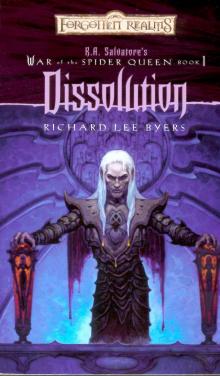 Dissolution
Dissolution Arkham Horror- Ire of the Void
Arkham Horror- Ire of the Void The Haunted Lands: Book II - Undead
The Haunted Lands: Book II - Undead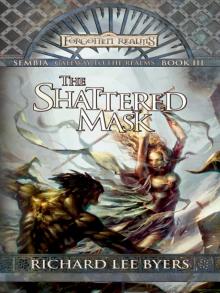 The Shattered Mask
The Shattered Mask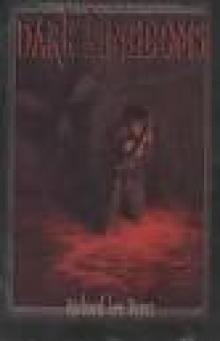 Dark Kingdoms
Dark Kingdoms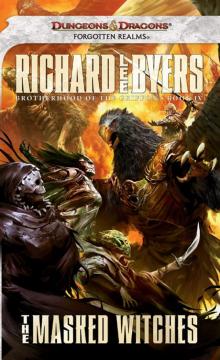 The Masked Witches: Brotherhood of the Griffon, Book IV
The Masked Witches: Brotherhood of the Griffon, Book IV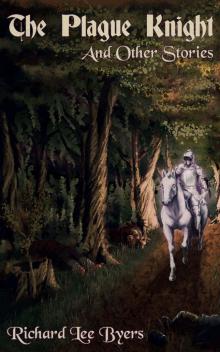 The Plague Knight and Other Stories
The Plague Knight and Other Stories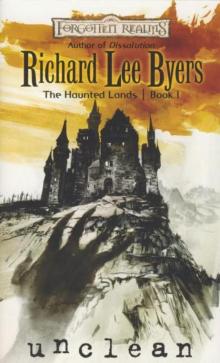 Unclean: The Haunted Lands
Unclean: The Haunted Lands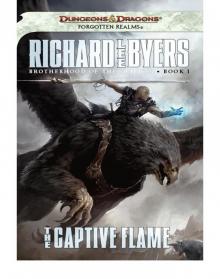 The Captive Flame: Brotherhood of the Griffon • Book 1
The Captive Flame: Brotherhood of the Griffon • Book 1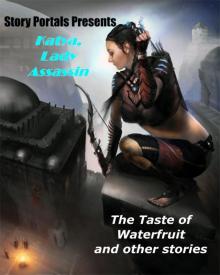 The Taste of Waterfruit and Other Stories (Story Portals)
The Taste of Waterfruit and Other Stories (Story Portals)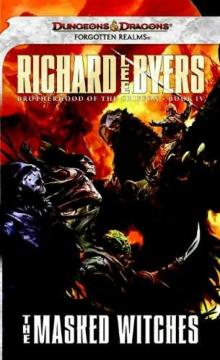 The masked witches botg-4
The masked witches botg-4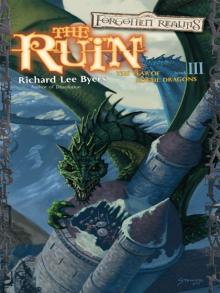 The Ruin
The Ruin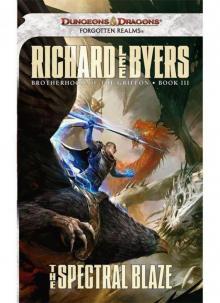 The Spectral Blaze botg-3
The Spectral Blaze botg-3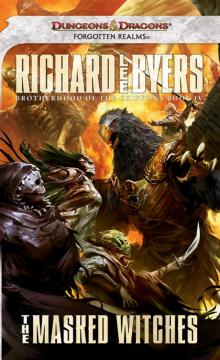 The Masked Witches
The Masked Witches Blind God's bluff bf-1
Blind God's bluff bf-1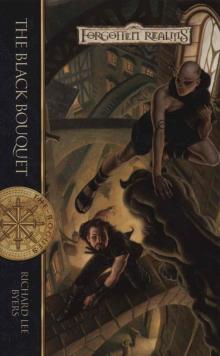 The Black Bouquet r-2
The Black Bouquet r-2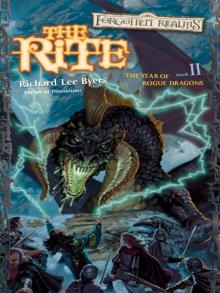 The Rite
The Rite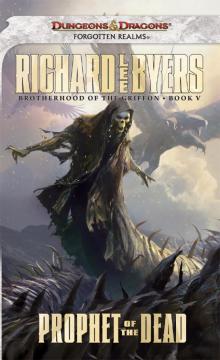 Prophet of the Dead: Forgotten Realms
Prophet of the Dead: Forgotten Realms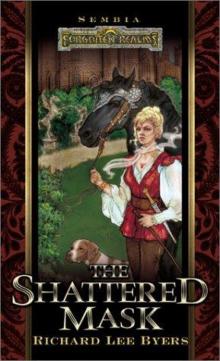 The Shattered Mask s-3
The Shattered Mask s-3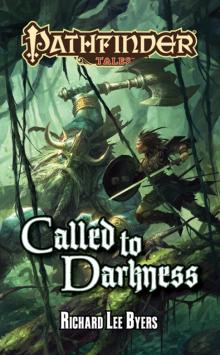 Called to Darkness
Called to Darkness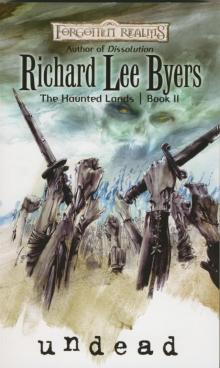 Undead hl-2
Undead hl-2 Blind God's Bluff: A Billy Fox Novel
Blind God's Bluff: A Billy Fox Novel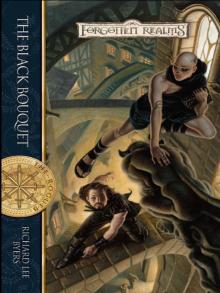 The Black Bouquet
The Black Bouquet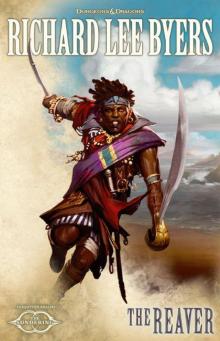 The Reaver
The Reaver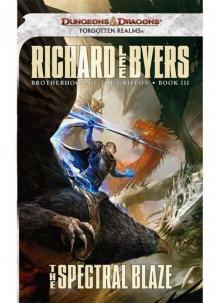 The Spectral Blaze: A Forgotten Realms Novel
The Spectral Blaze: A Forgotten Realms Novel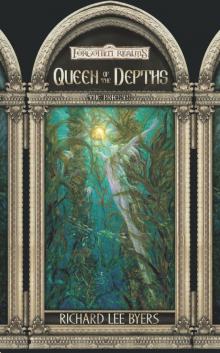 Queen of the Depths
Queen of the Depths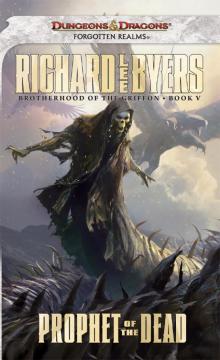 Prophet of the Dead botg-5
Prophet of the Dead botg-5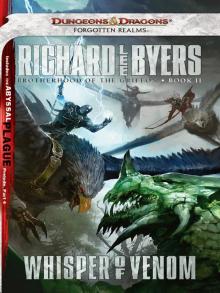 Whisper of Venom: Brotherhood of the Griffon, Book II
Whisper of Venom: Brotherhood of the Griffon, Book II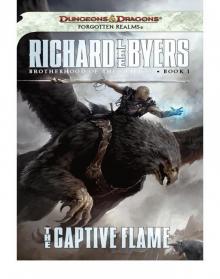 The Captive Flame botg-1
The Captive Flame botg-1 The Haunted Lands: Book III - Unholy
The Haunted Lands: Book III - Unholy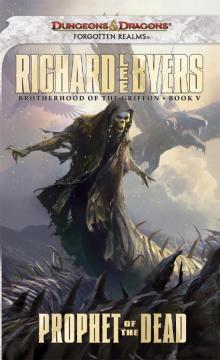 Prophet of the Dead
Prophet of the Dead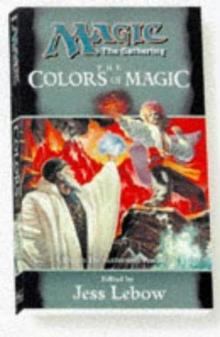 The Colors of Magic Anthology (magic: the gathering)
The Colors of Magic Anthology (magic: the gathering)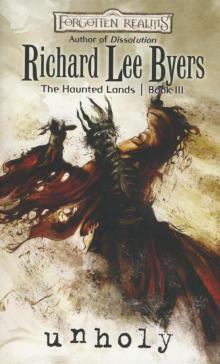 Unholy hl-3
Unholy hl-3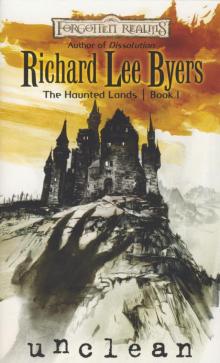 Unclean hl-1
Unclean hl-1 Blind God's Bluff
Blind God's Bluff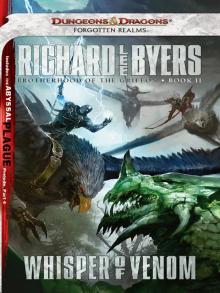 Whisper of Venom botg-2
Whisper of Venom botg-2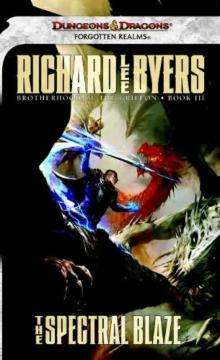 The Spectral Blaze
The Spectral Blaze